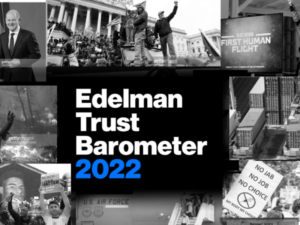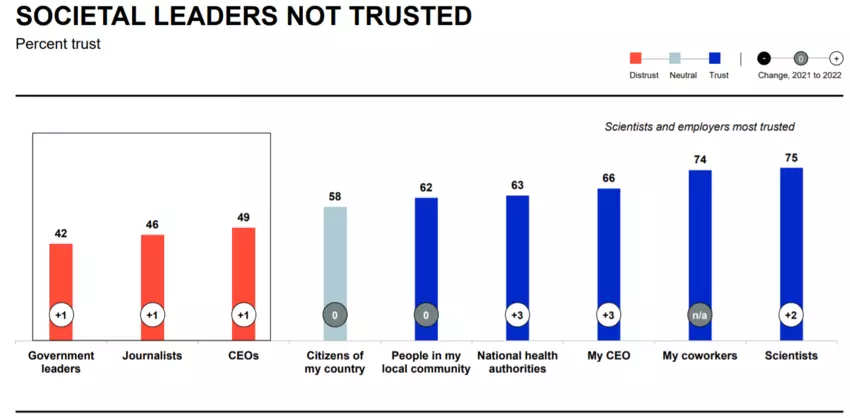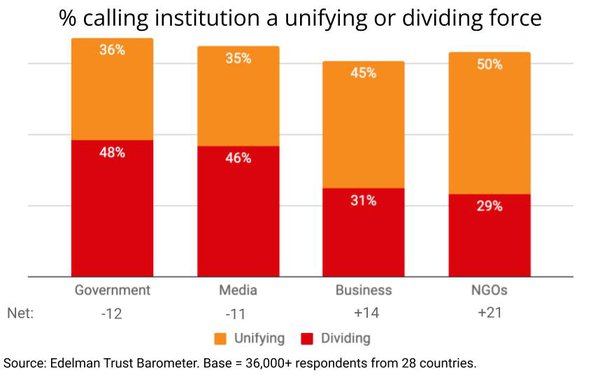Citizens of authoritarian regimes trust their major institutions more than citizens of democracies trust theirs, a global survey has found.
Public trust in governments running the world’s democracies has fallen to new lows over their handling of the pandemic and amid a widespread sense of economic pessimism, according to the 2022 Edelman Trust Barometer, which surveyed 35,000 respondents across 28 countries.
The Barometer, which for two decades has polled thousands of people on trust in their governments, media, business and NGOs, conversely showed rising scores in several autocratic states, notably China, Reuters reports.
“We really have a collapse of trust in democracies,” said Richard Edelman (above), whose Edelman communications group published the survey. “It all goes back to: ‘Do you have a sense of economic confidence?'” he added, noting high levels of concern about job losses linked either to the pandemic or automation.
 Trust in NGOs, business, government, and the media fell most sharply in Germany, Australia, the Netherlands, South Korea, and the United States since 2021. Participants were asked to indicate for each institution on a nine-point scale “how much you trust that institution to do what is right.” The report highlights what it calls the collapse of trust in democracies.
Trust in NGOs, business, government, and the media fell most sharply in Germany, Australia, the Netherlands, South Korea, and the United States since 2021. Participants were asked to indicate for each institution on a nine-point scale “how much you trust that institution to do what is right.” The report highlights what it calls the collapse of trust in democracies.
The number of people who believe they are being lied to by leaders has grown, the survey finds. Sixty-seven percent of respondents are convinced they are purposely misled by journalists – an eight-point increase, 66% say the same about government leaders (+9 ) and 63% say the same about business (+7).
That trust gap widens with high income individuals more likely to trust institutions by 15 points, disparities explained by widening political divisions, increasing social anxiety and institutions’ failure to generate change in areas such as climate change, the COVID-19 pandemic and work-force reskilling, said Edelman CEO Richard Edelman.
“In none of the democracies do people believe they’ll be better off in five years,” he said. “And [most of those people] think they’re going to lose their job, either because of the pandemic or because of automation. But the opportunity for businesses here as the most trusted institution is substantial.”

2022 Edelman Trust Barometer
Average trust in institutions stood at 83 and 76 in China and the United Arab Emirates, the two nations registering the biggest gains, up 11 and nine points, respectively, from last year. Saudi institutions also improved, with trust rising from 69 in 2021 to 72 in 2022.
Liberal Western democracies occupied most of the bottom two-thirds of the trust index rankings, although one authoritarian regime — Russia — finished dead last, with an average trust rating of only 32.
Rebuilding trust will require institutions to provide factual information that breaks the cycle of distrust, while leaders must focus on bringing people together on common ground issues – and on long-term thinking and making clear progress on areas of concern, the report suggests.
“Facing these myriad challenges will require both a new way of operating and a much higher level of performance from our core institutions,” says Edelman. “Government must finally gain control over the pandemic on a global basis.
It was some 10 years ago that analyst Ivan Krastev observed that although our societies are freer and more democratic than ever, trust in democratic institutions is in decline. While the rights of citizens in the West are better protected than ever, there is a growing feeling, particularly in Europe, that voters are losing their power, he told a forum at the National Endowment for Democracy (NED).








